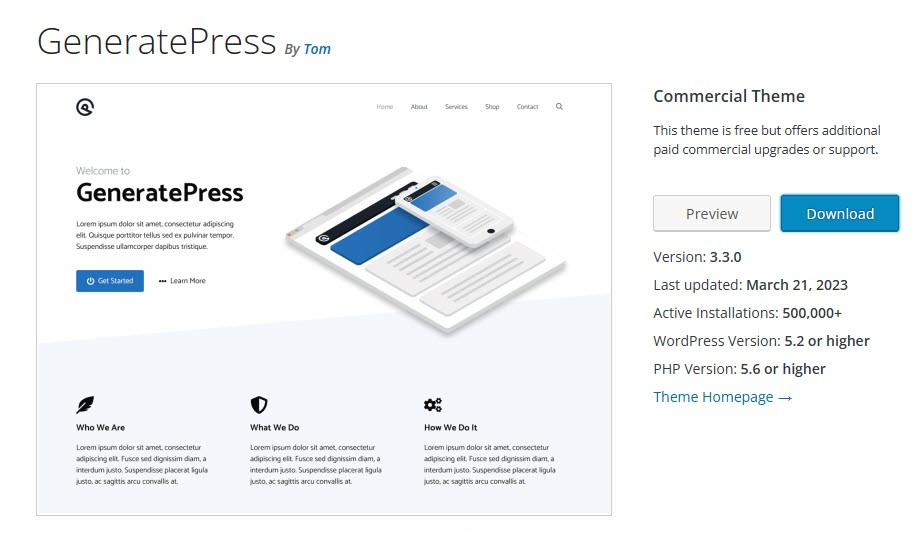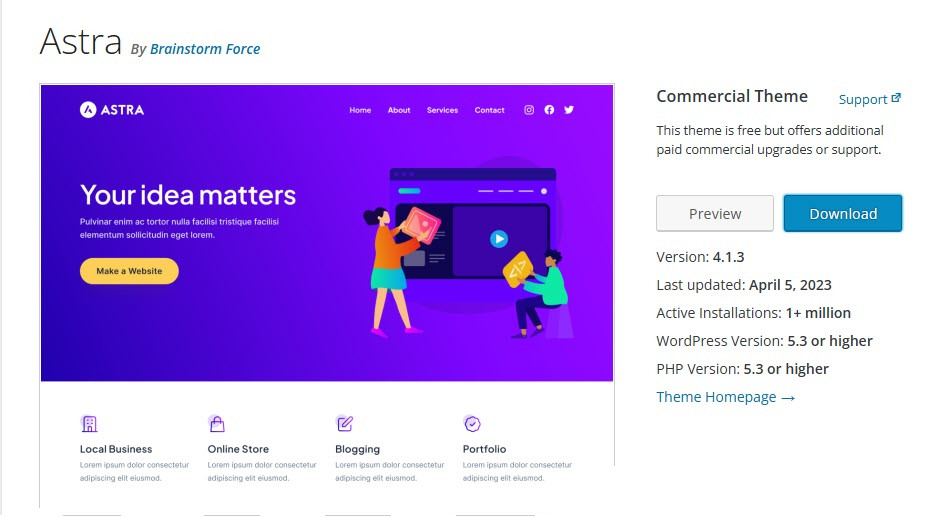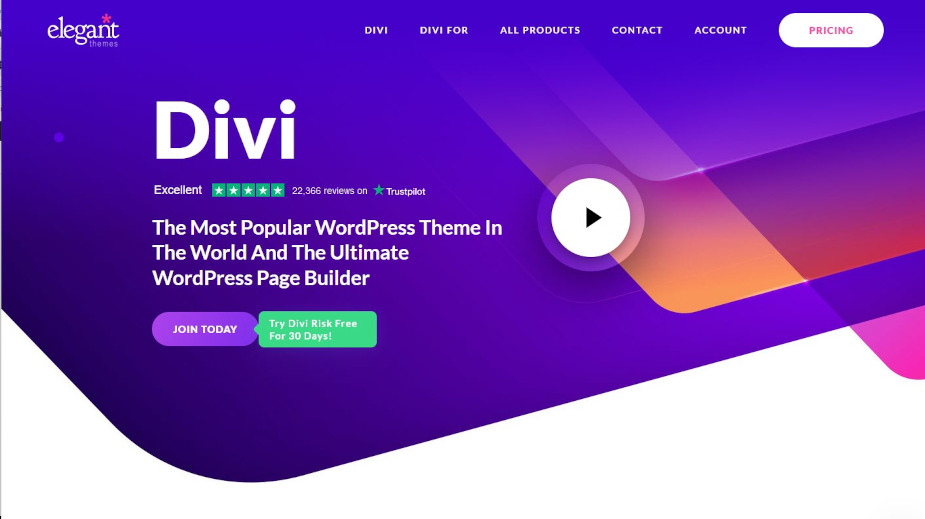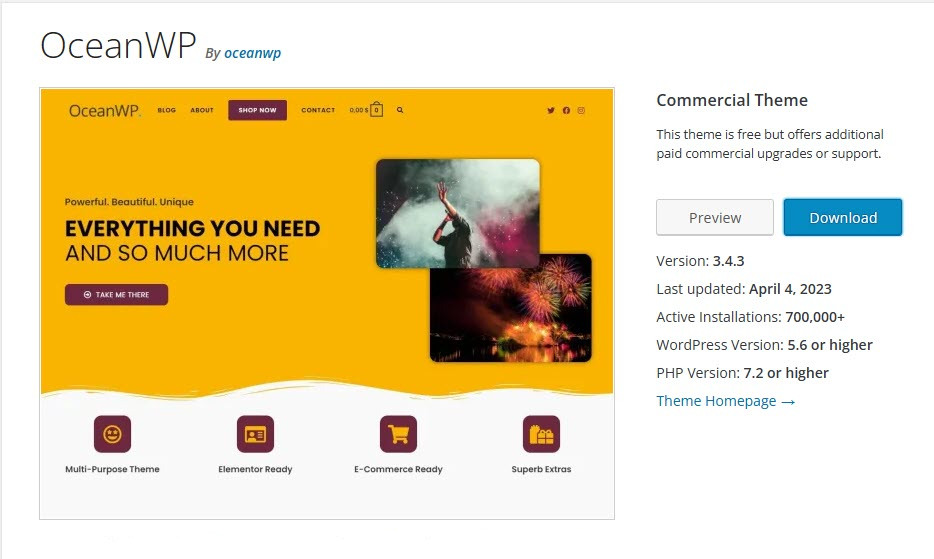How to Choose a WordPress Blog Theme
Article Categories
Blogging is an excellent way to share your thoughts and ideas with the world, and WordPress is one of the most popular blogging platforms on the internet. One of the best things about WordPress is its flexibility and customizability. With thousands of themes and plugins available, bloggers can create a unique and professional-looking blog that stands out from the crowd.
Choosing the right WordPress theme is an important first step for bloggers, it can affect the user experience, search engine rankings, and the overall appearance of the blog. This article explores examples of WordPress themes for bloggers. Its purpose is to help you find an attractive and functional blog that engages your audience, enhances your online presence, and is easy and fun for you to use.
The Importance of Choosing the Right WordPress Theme
The choice of a theme affects blog authors as well as blog readers. First, the theme can affect the user experience. It determines how your content is presented to your readers. A poorly designed or cluttered theme can make it difficult for readers to navigate your site, leading to a high bounce rate and reduced engagement.
Next, the theme can affect your search engine rankings, it determines how your site is structured and how easily search engines can crawl and index your content. Themes that are not optimized for SEO can lead to lower rankings, reducing your visibility and traffic.
And lastly, the theme can affect your branding and the blog’s overall appearance. A well-designed and visually appealing theme can help you create a strong and memorable brand, while a very plain or overly generic theme can make your blog look unprofessional and unremarkable.
Consider Your Skills
Take an honest look at your skills, interests, and goals for your new website. Do you plan to be strictly a blog author? Or do you have design and artistic skills you plan to use in making your website unique? What about any technical interests in coding, site maintenance, and a desire to customize the WordPress environment?
I’ve met people who very much enjoy the design or coding skills they have learned while being a WordPress blog author. Unfortunately, I’ve also experienced a number of people who are sometimes frustrated by the time requirements that site design and maintenance take away from time spent writing blog articles.
A nice-looking website is important to most blog authors. But not every author will have the design, artistic, and technical talents required to create a custom website. The lack of these skills doesn’t mean an author will be stuck with an ugly website.
Even if you lack the skill to do it yourself, there are options for getting the look you want for your blog. If you have the budget, some designers and developers can produce the exact look you have in mind.
If a professional design team isn’t for you, there are over 10,000 themes in the WordPress theme repository. https://wordpress.org/themes/ Just keep in mind while you browse these themes unless you spend additional time or money, or both, what you see is what you get.
Niche or Multipurpose Categories
Themes can be broken down into two broad categories, Niche or Multipurpose.
Niche
Niche themes are designed for a narrow purpose. Examples are podcasting, eCommerce, or blogs. This is a good fit for bloggers who don’t have the design skills or the desire to spend resources on theme building. Narrow your search filters to themes designed for blogging and pick the one closest to your ideal website.
A WordPress niche theme is a type of theme that is designed to cater to a specific type of website or niche. These themes are often built with a focus on specific industries, such as health and wellness, food and beverage, travel, or education.
Niche themes typically come with pre-designed templates and layouts that are tailored to the specific industry or niche, and may also include industry-specific features and functionality. They are a popular choice for website owners who want a theme specifically designed for their industry or niche and may offer more targeted design and functionality than a multipurpose theme.
Pros:
Targeted design: Niche themes are designed with specific industries or niches in mind, so they often come with industry-specific templates, layouts, and features.
Better functionality: Niche themes may offer features and functionality that are specifically tailored to the needs of a particular industry or niche, such as e-commerce integration or booking systems.
Easier customization: Because niche themes are designed with a specific purpose in mind, they may be easier to customize than multipurpose themes.
Cons:
Limited versatility: Niche themes may not be suitable for websites that need to cover multiple industries or niches.
Limited support: Niche themes may have a smaller user base, so support and updates may not be as readily available as with more popular themes.
Potentially higher cost: Because niche themes are tailored to a specific industry or niche, they may be more expensive than multipurpose themes.
Multipurpose Themes
A WordPress multipurpose theme is a type of theme that is designed to be versatile and flexible, with the ability to be used for a wide range of website types and niches. These themes often come with a comprehensive set of features and customization options, such as page builders, e-commerce integration, and pre-designed templates, allowing website owners to create a website that fits their specific needs.
Multipurpose themes are a popular choice for website owners who want a cost-effective and all-in-one solution for their website, but they may not be the best choice for those who require a high level of customization or have specific design requirements.
These themes are designed to meet a broad range of site types including a variety of preprogrammed style options. These themes keep an updated modern appearance with frequent major updates containing the latest innovations in internet technology.
Pros:
Flexibility: Multipurpose themes are designed to be versatile and flexible, allowing you to use them for a wide variety of website types and niches.
Saves time: Multipurpose themes often come with pre-designed templates and layouts that can save you time and effort in designing your website.
Comprehensive feature set: Multipurpose themes often come with a comprehensive set of features that includes everything you need to build a website, such as page builders, e-commerce integration, and customization options.
Cost-effective: Multipurpose themes can be a cost-effective option for website owners, as they offer a wide range of features and functionality for a single price.
Cons:
Bloated code: Multipurpose themes often have a lot of features and functionality, which can lead to bloated code and slower website performance.
Complexity: Multipurpose themes can be complex and overwhelming, especially for beginners who may not need all of the features included in the theme.
Limited customization: Multipurpose themes often have a lot of customization options, but these options can be limited and may not allow for the level of styling and customization that some website owners require.
Design limitations: Multipurpose themes often have a pre-designed look and feel, which may limit the creative freedom of website owners who want to create a unique and personalized website.
Overall, WordPress multipurpose themes can be a good option for website owners who want a flexible and cost-effective solution, but they may not be the best choice for those who require a high level of customization or have specific design requirements. It’s important to carefully consider the pros and cons before choosing a multipurpose theme for your website.
Free vs. Premium WordPress Themes
One of the obvious benefits of using free WordPress themes is cost savings. Free themes are readily available in the WordPress theme repository.
Free themes also offer basic customization options, including changing the color scheme and layout, which can be suitable for bloggers who are just starting and have a limited budget. Free themes are also regularly updated to ensure compatibility with the latest WordPress versions and to fix bugs and issues.
Benefits of Using Premium WordPress Themes
Premium WordPress themes offer advanced customization options and additional features not available in free themes. Premium themes usually have a higher level of design and functionality and offer more flexibility in customization.
They often come with additional support and documentation, making it easier for bloggers to set up and manage their blogs. Additionally, premium themes are typically optimized for performance, SEO, and security, which can save bloggers time and effort in optimizing their sites.
Factors to Consider When Choosing Between Free and Premium WordPress Themes
When choosing between free and premium WordPress themes, bloggers should consider several factors. The cost is an essential consideration, and bloggers should weigh the benefits of premium themes against their budget. Bloggers should also consider their technical skills, as premium themes may require more technical know-how to customize and manage.
Additionally, bloggers should consider their blog’s niche and target audience, as premium themes may offer specific features and design elements tailored to certain niches. Finally, bloggers should consider the level of support and updates offered by the theme, as this can impact their blog’s performance and security in the long term.
Factors for Judging Themes
Here is a list of criteria you can use to judge themes.
Speed
Speed is a factor to consider when choosing a WordPress theme for bloggers. A fast-loading theme can improve the user experience, reduce bounce rates, and enhance search engine rankings. When evaluating themes, look for themes that are optimized for speed and performance, with clean code, minimal use of scripts and plugins, and lightweight design.
Responsiveness
The concept of mobile-friendly design has been around since 2010 and today over one-half of all website traffic is from mobile devices. It would be difficult today to find a new theme that can’t produce fully responsive designs.
However, a fully responsive theme doesn’t guarantee a mobile-friendly experience, especially for smaller-screen visitors. It’s common to find web content that doesn’t display well on mobile devices. Mobile views should receive the same careful attention to layout and style as the desktop version.
Customization
Customization is also a factor to consider when choosing a WordPress theme for bloggers. A customizable theme can help you create a unique and personalized look for your blog and enhance your brand’s appearance. Look for themes with customizable options, such as custom color schemes, typography, layout options, and widgets.
SEO-Friendliness
SEO-friendliness is important for bloggers as it ensures your blog is optimized for search engine rankings and visibility. A theme that is not optimized can lead to lower rankings and reduced traffic. When evaluating themes, look for themes that are SEO-friendly, with clean code, optimized meta tags, and schema markup.
User-Friendliness
User-friendliness is an essential factor to consider when choosing a WordPress theme for bloggers. A user-friendly theme can help you create a blog that is easy to navigate, with intuitive menus, easy-to-read typography, and clear calls to action. When evaluating themes, look for themes with user-friendly layouts, easy-to-use navigation, and clear and concise content.
Price
Price is a necessary factor to consider when choosing a WordPress theme for bloggers. While there are many free themes available on the WordPress theme repository, premium themes often offer more advanced features, customization options, and support.
The price of premium themes can vary, with some themes priced at a one-time fee, while others require a recurring subscription. When evaluating themes, consider your budget and the features you need to make an informed decision. Additionally, some themes may offer a trial period or a money-back guarantee, allowing you to test the theme before committing to a purchase.
Ultimately, when choosing a WordPress theme for your blog, it’s important to balance cost and features to find a theme that fits your needs and budget. Consider the factors outlined above and evaluate each theme thoroughly before making a final decision. By doing so, you can ensure that your blog is equipped with a theme that enhances its functionality and appearance, engages your audience, and achieves your blogging goals.
Examples of Popular WordPress Blogging Themes
Here is a list of widely used, well-designed, and supported themes. Depending on your specific needs and goals, any of them can be good choices for blogging.
GeneratePress

GeneratePress is a very lightweight and one of the fastest-loading WordPress themes on the market. The theme has a design that is easy to customize and is popular among bloggers.
Key Features:
Speed: Lightweight and fast-loading
Responsive design: Yes
Customizable options: including typography, colors, and layout options
SEO-friendly: with clean code and optimized meta tags
User-friendly layout: with intuitive navigation and clear calls to action
Pricing: The theme offers a free version with limited features, and a premium version priced at $59 per year, or $249 one-time payment. Paid versions include advanced customization options, support, and updates.
Astra

Astra is a popular WordPress theme for bloggers that is known for its speed. The pro version provides flexibility and customizability. The theme has a lightweight design that loads quickly and is optimized for performance. Astra is a responsive theme that works well on all devices, and it has a user-friendly layout that is easy to navigate.
Key Features:
Speed: Lightweight and fast-loading
Responsive design: Yes
Customizable options: includes typography, colors, and layout options WooCommerce. You may find the features in the free version to be somewhat limited.
SEO-friendly: with clean code and optimized meta tags
User-friendly layout: has intuitive navigation and clear calls to action
Pricing: The theme offers a free version with limited features, as well as a premium version priced at $59 per year and $299 lifetime. There are two additional bundled plans which include advanced customization options, plugins, and add-ons.
Divi

Divi is a popular multipurpose WordPress theme that is ideal for bloggers who want a customizable theme. The theme has a page builder that makes it easy to create custom layouts and designs, and it has a large library of pre-built templates that can be used to jumpstart your blog. Because of its many features, this theme has a learning curve.
Key Features:
Speed: Resource intensive
Responsive design: Yes
Customizable options: Drag-and-drop interface for easy customization, large library of pre-built templates
SEO-friendly: with clean code and optimized meta tags
User-friendly layout: with intuitive navigation and clear calls to action
Pricing: The theme is priced at $89 per year or a one-time fee of $249, which includes advanced customization options, support, and updates.
OceanWP

OceanWP is a lightweight and customizable WordPress theme that is popular among bloggers. The theme has a minimalistic design that is easy to customize and optimize for speed and performance. It’s page builder friendly and works well with third-party drag-and-drop builders.
Key Features:
Speed: Lightweight and fast-loading
Responsive design: Yes
Customizable options: includes typography, colors, layout options, and image galleries
SEO-friendly: clean code and optimized meta tags
User-friendly layout: intuitive navigation and clear calls to action
Pricing: The theme offers a free version with limited features, as well as a premium version priced at $54 per year, which includes advanced customization options, support, and updates. There are additional plans for more websites and features.
Hestia

Hestia is a modern and stylish WordPress theme that is ideal for bloggers who want a clean and minimalistic design. The theme has a responsive layout that looks great on all devices, and it has a user-friendly interface that is easy to navigate.
Key Features:
Speed: Lightweight and fast-loading
Responsive design: Yes
Customizable options: includes typography, colors, layout options, and image galleries
SEO-friendly: clean code and optimized meta tags
User-friendly layout: intuitive navigation and clear calls to action
Pricing: There is a free theme that includes basic customization options, as well as a premium version priced at $69 per year, which includes advanced customization options, support, and updates. There are two additional plans for more websites.
Recap of Key Points
Bloggers can choose from various free and premium WordPress themes, each offering its benefits and drawbacks. Free themes are a suitable option for bloggers on a budget or those starting and looking for basic customization options. Premium themes offer advanced customization, features, and support, making them a better option for bloggers with more significant budgets or those with specific design and functionality requirements.
Speed, responsiveness, customization, SEO-friendliness, user-friendliness, and price are factors to consider when choosing the best WordPress theme for bloggers.
Free themes offer cost savings and basic customization, while premium themes offer advanced customization, features, and support.
Final Thoughts about Choosing the Best WordPress Theme for Bloggers
Take into account your budget, technical skills, niche, target audience, and the level of support and updates offered by the theme when choosing between free and premium WordPress themes. It’s always a good idea to research and test different themes before settling on one that suits your blog’s unique needs and goals.
Regularly updating your theme will ensure compatibility with the latest WordPress versions and take advantage of new features and fixes. Always prioritize user experience by making sure your chosen theme is easy to navigate and use for your audience. By considering these factors, you can select the best WordPress theme for your blog and set your website up for success.
NEW ARTICLES
Celebrating Two Decades of WordPress
WordPress has proven to be an unstoppable force in the ever-evolving digital landscape, where adaptability and customization are keys. As we look at the first twenty years [...]
DISCLAIMERS:
WPChronicle.com uses affiliate links and pay-per-action advertising. If you click these links or use them to buy something we may earn a commission.
WPChronicle.com may contain copyrighted material. This use may not have been specifically authorized by the copyright owner. The material contained in this website is distributed for informational and educational purposes. Small portions of the original work may have been used but those portions could not easily be used to duplicate the original work. This usage constitutes ‘fair use’ of any such copyrighted material (referenced and provided for in section 107 of the US Copyright Law).
All trademarks displayed here are the property of their owners and are neither an endorsement nor a recommendation for or from those organizations. The use of trademarks or links to the websites of third-party organizations is not intended to imply those organizations endorse or have any affiliation with WPChronicle.com.